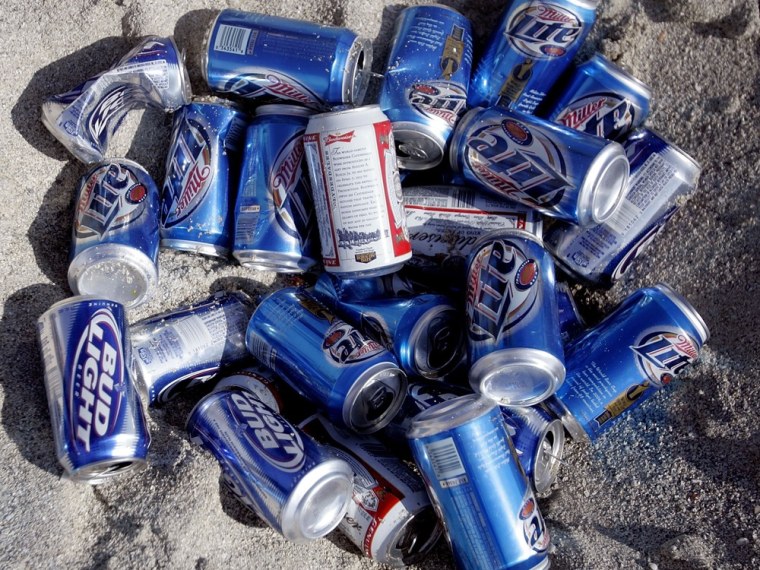Binge drinking among high school seniors may have declined slightly, but the rate of extreme bingeing -- people who knock back more than 10 drinks at a time -- has remained steady, a new study shows.
University of Michigan researchers, analyzing data from a nationally representative sample of 12th graders, found that one in 10 high school seniors reported consuming 10 or more drinks in a single bout over the previous two weeks. One in 20 reported they'd consumed 15 or more drinks in a row over the same time period.
“The rate of 1 in 10 is pretty alarming,” said the study’s lead author, Megan Patrick, a research assistant professor at the Institute for Social Research at the University of Michigan. “And if we had asked how many times this happened over the past year [instead of the past two weeks] the rates probably would have been higher.”
The study looked at surveys that were collected annually from 2005 to 2011 as part of the ongoing Monitoring the Future study, which began in 1975. While the overall rate of bingeing, defined as five or more drinks in a single bout, dropped four points during that period, the rate of those who drank 10 or more stayed the same.
Patrick and her colleagues decided to look at rates of underage extreme binge drinking to try to explain why, when binge drinking among teens had dropped overall, the rates of visits to the emergency room had not declined.
“Those who are drinking 15 or more are at high risk of needing hospitalization and other kinds of health care use for negative consequences,” Patrick said. “Even though the overall rate is going down, we’re seeing that the most extreme behaviors are not decreasing.”
Factors that increase risk of extreme bingeing include being white, male and living in a rural environment.
Researchers examined data from 16,332 high school seniors across the United States from 2005 to 2011. In 2005, 22 percent of high school seniors reported they had consumed five or more drinks in a single bout during the previous two weeks. That’s compared to 18.1 percent in 2011. In the same time period, the number of those who knocked back 10 or more drinks in a single bout went from 10.5 to 9.6 percent, while those who downed 15 or more drinks in a single bout went from 5.5 percent to 4.4 percent. That might look like a slight decrease in the extreme bingers, but the drop wasn’t statistically significant, Patrick said.
More research on extreme bingeing is needed, wrote Ralph W. Hingson, an epidemiologist at the National Institute on Alcohol Abuse and Alcoholism, in an editorial accompanying the article. This kind of drinking in teens dramatically increases the risk of serious injury and overdose, he wrote.
Consuming 15 or more drinks during a four hour period on an empty stomach can lead to blood alcohol levels well above 0.30 percent in a male, Hingson noted. For someone under age 21, a blood alcohol level of 0.15 can lead to devastating consequences, studies have shown.
“For drivers aged 16 to 20 years at that BAL, the increased risk of a fatal crash approached 500 times that for a sober, same-aged driver,” Hingson wrote.
While not common, “kids do die from alcohol poisoning,” said Dr. John Walkup, director of the division of child and adolescent psychiatry at NY-Presbyterian/Weill Cornell Medical Center.
Further, “it’s known that the earlier you start drinking, the greater the risk for addiction,” Walkup said. “Also, those who can tolerate large quantities of alcohol are the most vulnerable to becoming addicted.”
The best defense against teen binge drinking is parental supervision, Walkup said.
“Parents are the anti-drug,” he added. “The data are pretty good that parents who supervise their children can reduce substance abuse. You’ve seen the public service announcements showing a parent asking, ‘Where are you going? Who are you going with? What are you going to do?’
“It isn’t necessarily asking the questions that is important, it’s knowing where your kid is and who he’s with.”
The most important thing a parent can do, Walkup said, is to know their kids.
“When I see kids in trouble I ask the parents if their kid is transparent or is he opaque,” Walkup said. “Those with kids in trouble often say they see their kids as opaque and puzzling, while the kids see their parents as clueless and easily fooled. The kids will say ‘They have no idea who I am.’”
